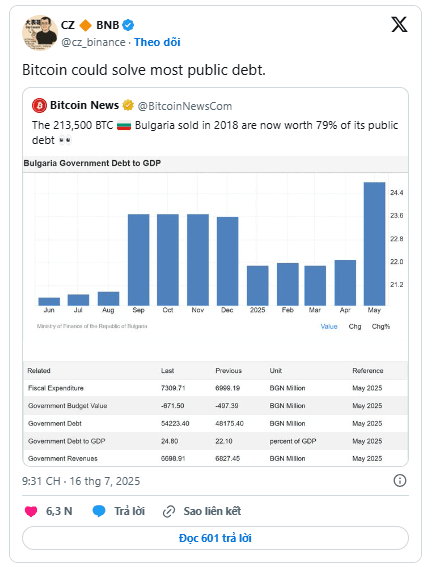Changpeng Zhao, former CEO of Binance, reignited the debate by suggesting that Bitcoin could help manage escalating public debt. Speaking in July 2025, Zhao highlighted Bitcoin's decentralized nature as an inflation hedge for governments worldwide.
Zhao's comments emphasize Bitcoin's role as a financial hedge and its potential to address global financial instability, further reinforcing the growing view of integrating Bitcoin into national economic strategies.
Advocacy for Bitcoin Adoption
Changpeng Zhao, a prominent figure in the cryptocurrency space, rekindled discussions on public debt by advocating for government adoption of Bitcoin. He argues that Bitcoin's decentralized nature could hedge against inflation and address irresponsible spending.
The former CEO of Binance argues that countries like the United States and China could stabilize their economies by integrating Bitcoin into their financial systems. Zhao observes a growing interest in digital assets from sovereign nations.

Global Impact and Response
Although there have been no direct funding impacts observed yet, Zhao's perspective aligns with countries exploring Bitcoin reserves and related financial products. The potential for significant market impact is gaining widespread attention.
His proposal faced mixed reactions; some see the potential of Bitcoin-backed reserves, while others express concerns about volatility. However, interest in digital assets as a financial tool remains high, especially in inflation-sensitive countries.
"Bitcoin has the potential to address the escalating public debt crisis... Bitcoin, with its decentralized nature and fixed supply of 21 million coins, provides a hedge against inflation and irresponsible government spending. If many governments allocate a portion of their reserves to Bitcoin or use it instead of traditional fiat currency in certain areas, this could stabilize their economies in the long run." - Changpeng Zhao, Former CEO, Binance, source
Historical Context and Future Prospects
Historical precedents include El Salvador, a country that has accepted Bitcoin as legal tender, and Bulgaria, a country that missed out on significant profits by selling Bitcoin too early. These cases highlight the potential impact of digital currency.

Zhao's commentary suggests that changes in financial strategy could enhance the appeal of digital assets. Historical trends indicate the potential for managing public debt through cryptocurrency, provoking both curiosity and skepticism.


